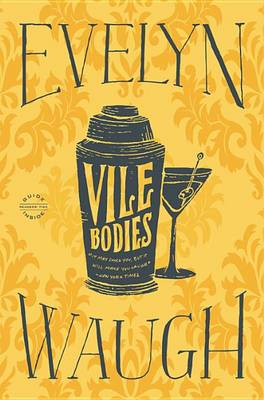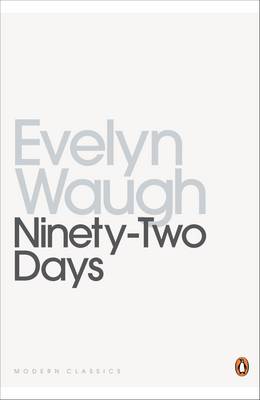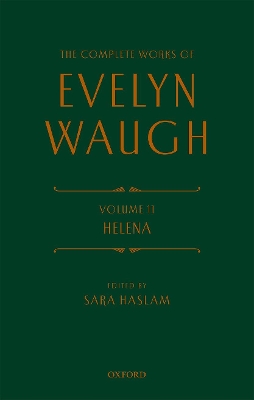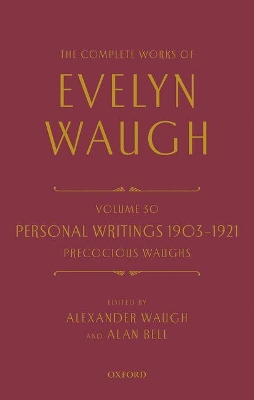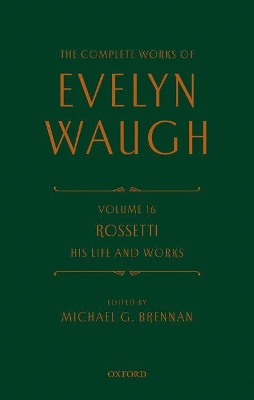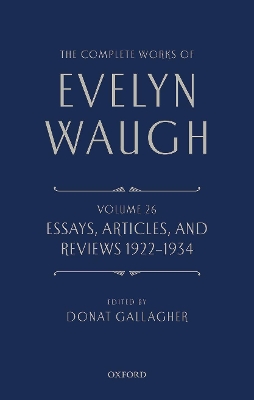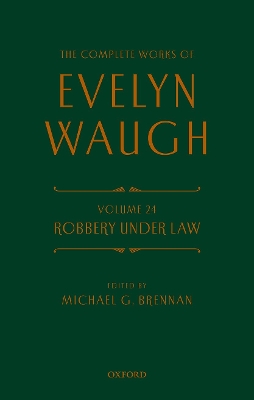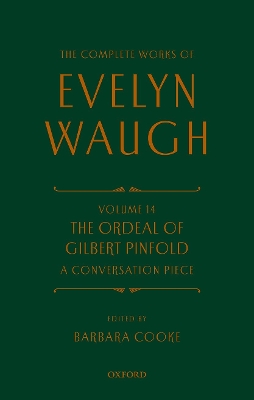The Complete Works of Evelyn Waugh
10 total works
In the years following the First World War a new generation emerges, wistful and vulnerable beneath the glitter. The Bright Young Things of twenties' Mayfair, with their paradoxical mix of innocence and sophistication, exercise their inventive minds and vile bodies in every kind of capricious escapade - whether promiscuity, dancing, cocktail parties or sports cars. In a quest for treasure, a favourite party occupation, a vivid assortment of characters, among them the struggling writer Adam Fenwick-Symes and the glamorous, aristocratic Nina Blount, hunt fast and furiously for ever greater sensations and the fulfilment of unconscious desires.
If you enjoyed Vile Bodies, you might like Waugh's A Handful of Dust, also available in Penguin Modern Classics.
'The high point of the experimental, original Waugh'
Malcolm Bradbury, Sunday Times
'This brilliantly funny, anxious and resonant novel ... the difficult edgy guide to the turn of the decade'
Richard Jacobs
'It's Britain's Great Gatsby'
Stephen Fry, director of Vile Bodies film adaptation Bright Young Things
A Tourist in Africa was Evelyn Waugh's final travel book, and one of his most interesting. Restless and intolerant of the English winter, Waugh boards the Pendennis Castle for East Africa by way of Italy and Suez, going on to retrace the routes of journeys he took as a much younger man through Kenya, Tanganyika, the Rhodesias, and other East African countries. He embarks on his trip at the very moment when many of these countries are beginning to assert their independence after decades
of British rule. As he travels, Waugh contemplates the changing face of an Africa he has known intimately as well as his own increasingly awkward fit in the modern world. Even as he contends with his own encroaching age and the unwelcome changes to international travel, his usual zest for adventure and
discovery asserts itself at every turn. A much better sailor than flyer, Waugh laments the impending eclipse of sea travel as well as the declining appetite for danger and daring he witnesses in some of his companions. This edition provides hundreds of contextual notes to illuminate the historical, cultural, and biographical details of most interest to readers of Waugh, travel writing, and African history; a complete textual history which traces every change made to the text from Waugh's first
drafts to the first published British and American editions; new and original illustrations; and a thorough but eminently readable introduction by Patrick R. Query.
Set in the 4th century AD, and Waugh's only historical novel, Helena is the story of the mother of Emperor Constantine and her reputed discovery of the 'True Cross'. Waugh described Helena as his favourite among his works--in a Face to Face interview with John Freeman for the BBC in 1960, for example. His fictional account of Helena's widely-celebrated life and pilgrimage is the product of detailed historical research, and it contributes to our understanding of Waugh's views of the Church, both ancient and modern. Uniquely, however, Helena also demonstrates Waugh's interest in domestic politics set against a backdrop of significant historical acts.
This edition of Helena provides the first detailed textual history of the novel. Covering such matters as 'Publication History', 'Cultural Contexts', and 'Critical Reception', the introduction facilitates successful engagement with Waugh's novel from a variety of perspectives, as well as equipping the reader with detailed understanding of its fascinating and complex textual history. Readers are also furnished with a detailed set of explanatory notes which provide information about the people, places, events and texts referenced in Waugh's only historical novel, as well as pointing out links in theme or idea with others of Waugh's works.
Volume one of the series covers the years 1903-1921, ending with Waugh's departure from Lancing College, aged 18, with a scholarship to Hertford College, Oxford. For many years at Lancing Waugh kept a daily account of his life, and every diary entry is reprinted here along with the lively pen-and ink drawings that accompanied them and the letters he sent to his parents and friends. No other book presents such a rich anthology of writing by a school-boy, let alone one who would later turn into
a major literary figure and novelist of genius.
This, Waugh's first published book, marked the centenary of the birth of the painter and poet Dante Gabriel Rossetti (1828-1882). Waugh was fascinated by the bohemian lives of the Pre-Raphaelite painters, and by his own family connection with them (William Holman Hunt had married, successively, two cousins of his grandfather). Rossetti is both compassionate towards its subject and critical of his self-destructive nature. The incisive analysis of Rossetti's painterly techniques
contributed to the resurgence of public interest in Rossetti's art and poetry. The biography was also an early expression of Waugh's lifelong interest in narrative art, and laid the foundations for his own belief in the importance of the spiritual as well as the aesthetic vision of the artist. Although Rossetti was
hastily compiled, it is nevertheless elegant and witty.
This first volume of Evelyn Waugh's Articles, Essays, and Reviews contains every traceable piece of journalism that research could uncover written by Waugh between January 1922, when he first went up to Oxford, and December 1934, when he had recently returned from British Guiana and was enjoying the runaway success of A Handful of Dust.
Long interred in fashion magazines, popular newspapers, sober journals, undergraduate reviews, and BBC archives, 110 of the 170 pieces in the volume have never before been reprinted. Several typescripts of articles and reviews are published here for the first time, as are a larger number of unsigned pieces never before identified as Waugh's. Original texts, so easily distorted in the production process, have been established as far as possible using manuscript and other controls. The origins of
the works are explored, and annotations to each piece seek to assist the modern reader.
The volume embraces university journalism; essays from Waugh's years of drift after Oxford; forcefully emphatic articles and contrasting sophisticated reviews written for the metropolitan press from 1928 to 1930 (the most active and enterprising years of Waugh's career); reports for three newspapers of a coronation in Abyssinia and essays for The Times on the condition of Ethiopia and on British policy in Arabia. Finally, in early 1934 Waugh travelled for three months in remote
British Guiana, resulting in nine travel articles and A Handful of Dust, acclaimed as one of the most distinguished novels of the century. Waugh was 19 when his first Oxford review appeared, 31 when the Spectator printed his last review of 1934. This is a young writer's book, and the always lucid articles and
reviews it presents read as fresh and lively, as challenging and opinionated, as the day they first appeared.
This is the first fully annotated critical edition of Waugh's book on Mexico, Robbery Under Law: The Mexican Object-Lesson (1939), based on three months' research by Waugh in the country in 1938 and rarely included in later reprints of Waugh's travel writings. Waugh insisted in its opening words: 'This is a political book'; it traced the expropriation of British and American oil interests in Mexico by its repressive Marxist government. It described the current political and social
inequities suffered by both its Mexican citizens and foreign companies trading there and also provided a powerful account of the history of Catholic persecution in the country. Its narratives offered an implicit but potent warning about the barbarity of totalitarian regimes as war in Western Europe grew
increasingly likely.
In winter 1954, Evelyn Waugh took a voyage to Sri Lanka to escape the English cold and recover his ailing health. Visibly unwell when he boarded ship, once at sea he began suffering auditory hallucinations that pursued him through his 'holiday' and back on to an early flight home. He then fictionalized his experiences as The Ordeal of Gilbert Pinfold. This curious novel has baffled and intrigued critics ever since its first publication in 1957 and is now presented in a full critical
edition. This new volume charts the creation and publication of the novel and examines its cultural and literary significance, noting every textual change and revision from manuscript to the last edition to be published in Evelyn Waugh's lifetime. It has a comprehensive appendix of contextual notes and an
extensive scholarly introduction covering all aspects of the history of this text and its place in cultural and literary history. It draws on newly discovered material, including Waugh's engagement diaries, to tell the story behind the narrative and explain how fantasy and painful reality intertwine in this highly biographical work of fiction.
